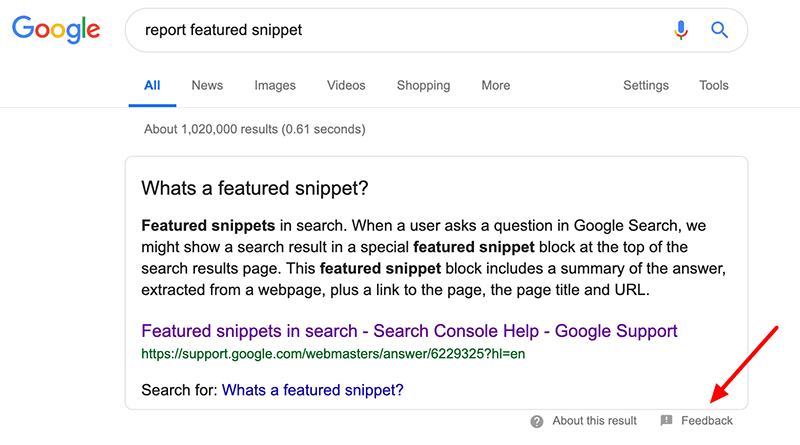Here’s the content Google aims to keep out of featured snippets
Recently, Google’s practices around which sites and types of content it may include in featured snippets have raised censorship concerns and talk of blacklists in some circles. We asked Google to clarify its policies around the types of content eligible for featured snippets and how it finds and removes content deemed inappropriate for those placements.
What are featured snippets? Featured snippets are generally blocks of content sourced from pages across the web. Google shows them at the top of search results pages for some search queries. They can show up in paragraph form, with images, they can include bulleted lists, tables and more. They aim to give searchers a concise answer to a query that can be scanned by the user or read aloud Google Assistant.
Over a year ago, Google published a comprehensive guide to featured snippets.
What types of content does Google aim to keep out of featured snippets? Google does not intend to show featured snippets for content that falls within several categories:
In the context of that last category, Google specifically designed systems to generally prevent Op-Ed content from showing up as featured snippets. That means sites and pages that include highly polarized content that’s unlikely to represent consensus viewpoints on a range of sensitive topics would also be excluded from being shown as featured snippets.
“Featured snippets are a feature within Search that highlights web sources that are likely to contain what you’re looking for. Due to the special formatting they receive, we have policies that prevent us from showing a featured snippet for topics like civics or medical information where the content lacks broad consensus,” a Google spokesperson told Search Engine Land. “Our systems are designed to not show featured snippets that would violate our policies, and we take action if violating snippets still appear. These policies and actions have no impact on how a page ranks in organic search listings.”
How does Google keep content out of featured snippets? Primarily Google designs algorithms to detect and automatically remove the types of content that don’t conform with its content policies for featured snippets. Google handles way too many searches per day and finds way too much new content per day to rely on humans to manually remove all these types of content. So, Google says, “our systems automatically strive not to show featured snippets that would violate our policies. However, the scale of search is so large that no system can be perfect. This is why we provide a public reporting system.”
Google can generate lists algorithmically to identify a large number of sites likely to contain highly polarized content that would be unlikely to represent consensus viewpoints on a range of sensitive topics, and would thus be likely to violate the policies listed above. Google says the vast majority of sites on this list are not political. Furthermore, Google told us it does not encode any notion of political leaning or preference into Google’s products, including Google Search.
When the algorithmic lists and detection systems fail, Google will take action manually. You can report featured snippets by clicking on the “feedback” link under the featured snippet after a query to notify Google of an issue.

Not penalized in core search. Just because a site is not eligible to show in Google’s featured snippets section does not mean it won’t rank in core web search. Google told us these sites still rank as they normally would in organic search results, there is no impact on ranking and no penalty applied to these sites in normal web rankings.
Why we should care. Featured snippets can be a great source of traffic to a web site from Google search. It can also be the only source of traffic from Google Assistant and Google Home device voice queries. Typically publishers and webmasters want content shown in the featured snippet box for a given query, but if your content falls within these categories, the chances of your content being featured is unlikely.
About The Author Barry Schwartz is Search Engine Land's News Editor and owns RustyBrick, a NY based web consulting firm. He also runs Search Engine Roundtable, a popular search blog on SEM topics.


0 Comments